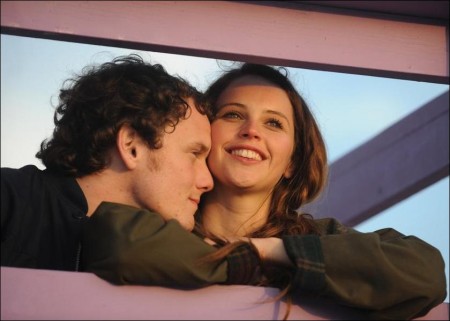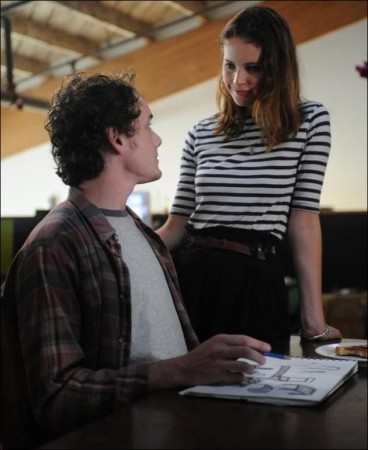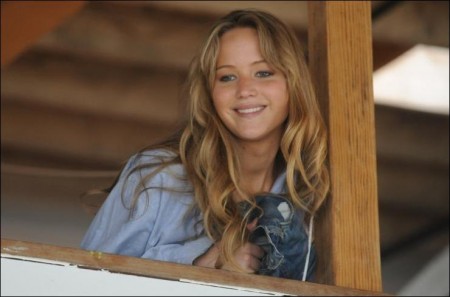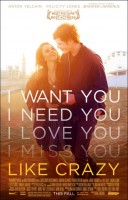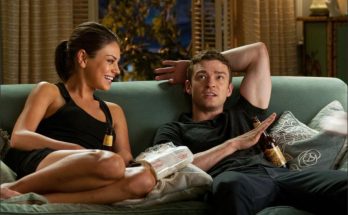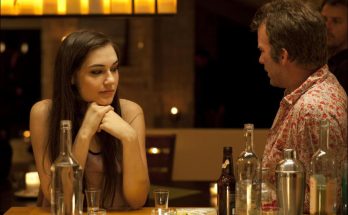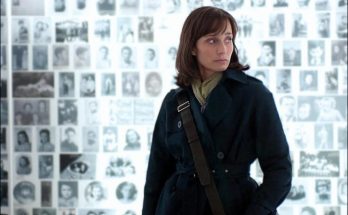Taglines: I want you – I need you – I love you – I miss you.
A love story is both a physical and emotional tale, one that can be deeply personal and heartbreaking for an audience to experience. Director Drake Doremus’ film Like Crazy beautifully illustrates how your first real love is as thrilling and blissful as it is devastating. When a British college student (Felicity Jones) falls for her American classmate (Anton Yelchin) they embark on a passionate and life-changing journey only to be separated when she violates the terms of her visa.
Like Crazy explores how a couple faces the real challenges of being together and of being apart. Winner of the Grand Jury Prize for Best Picture at the 2011 Sundance Film Festival and of the Special Jury Prize for Best Actress for Felicity Jones, Like Crazydepicts both the hopefulness and the heartbreak of love.
Like Crazy is an American romantic drama film directed by Drake Doremus and starring Anton Yelchin, Felicity Jones and Jennifer Lawrence. Written by Drake Doremus and Ben York Jones, the film is about Anna (Jones), a British exchange student who falls in love with an American student, Jacob (Yelchin), only to be separated from him when she is denied re-entry into the United States after overstaying her student visa.
About The Story
Like Crazy is not so much a love story as a story about what we experience when we’re in love – the excitement, the inspiration, the communion, the angst and the all-out craziness that envelop us, shake us and leave us wondering what on earth just happened to us. Rather than spin another ethereal fairy tale about the ideal of love, Drake Doremus decided to get down into the dirt with the sheer emotional reality of falling into it –- and then battling to sustain it, especially in a world in which geography, technology and individuality seem to conspire against it at every turn.
To do so, Doremus worked in his typically unconventional style. He did not pen a traditional screenplay. He wanted something more alive, more spontaneous, more filled with the surprises, good and bad, that love –especially the mad, addictive love of unbridled youth — always brings. So Doremus began with a kind of in-depth, extended outline, co-written with his friend Ben York Jones, who starred in his previous film, the dramatic comedy Douchebag. Though it did not lay out hard-and-fast dialogue, the outline delved into subtext, character back stories, scene direction and nuanced details that gave those who read it a visceral sense of Anna and Jacob’s journey with each other.
At the time, Doremus was in the throes of heartache and felt an urgent need to explore creatively what he had just been through emotionally. “The story of Like Crazy began as an amalgamation of some intense relationships that I’ve had, and perhaps one in particular, and it felt very, very personal,” he says. “I was hungry to work on it and it just poured out. I needed to tell this story, I had so much to express – about certain emotional moments and about the way two people navigate a relationship that is so meaningful yet isn’t necessarily going to last — and it was all bottled up. I wrote a first draft and then I worked with Ben York Jones, my writing partner, to hone that draft and we started moving very quickly. When I have an idea, I kind of have the need to act on it immediately. When you know the characters and you know the movie you want to make, if you wait, things change. To me, the most important thing was a quality of genuineness to those feelings I was in the midst of right then.”
As Doremus and Jones began exploring more deeply into Like Crazy, they kept a laser-focus on emotions. They kept the narrative of Jacob and Ann’s love affair full of tension yet included no break-up sequences. They honed in on those fleeting, contrast-filled moments that stick with you more than the obvious moments –the ones that haunt you in the night and propel you to keep trying to make love work.
They also began to crack open the puzzle of why the greatest and most all-consuming encounters with love can feel both very real and completely illusory, can seem to be both the deepest connection of all and proof that no one can ever fully know the underneath of another’s skin.
In some ways, this love is really a blank canvas for Anna and Jacob,” observes Doremus. “They’ve never had these feelings before, so they project so much onto each other and then they become that projection with each other. But then, when they have to be apart, they begin to wonder if what they had, and that person they knew, is just fantasy and they start to think the other person might not be quite what they imagined. Yet, when they’re together, the important thing is they really believe in what they see in each other. They want it to be true and they want it to endure.”
What had been so intensely internal for Doremus at the outset now began to resonate with others. “I really thought this experience was so personal that no one else might relate to it,” laughs Doremus, “but then it turned out that anyone who’s been in love seemed to know exactly what I was talking about.”
Producer Jonathan Schwartz, who has worked with Doremus from the beginning of his career, recognized right away that Like Crazy was going to be something special. He and his partner in Super Crispy Entertainment, Andrea Sperling, began talking with Doremus about the film in March of 2010 and they were already shooting by June 1st of the same Spring.
“Drake is someone with a rare passion and fire, and he has this idea that he wants to make a movie a year,” explains Schwartz. “Right after Douchebag, he came to me with this idea, and it was so personal and based on his own experiences, and yet it was so universal that everyone recognized their own experiences in it. Everyone has been through first love or hard love or long-distance love with all the ‘if only’ feelings that come with those things and the film is so true to that experience. There was no doubt in my mind that Drake could do this in his own unique way – he has always been very strong at telling love stories that are fun and touching and also serious. And he’s a force of nature in terms of his energy.”
Sperling, who worked with Doremus for the first time on Like Crazy, adds: “Drake is open-minded but he’s unwavering in his vision and his passion is infectious. It was really interesting to become part of his unique process, which is highly collaborative, but in a very different way from other films I’ve worked on. The process is intense and fun and leads to a lot of exciting ideas. At the same time, it was very raw, because it was all coming from his personal experience, and very intimate, because we had a very small cast and crew in small spaces shooting with a very small camera.”
Schwartz and Sperling were soon joined by a team that includes executive producers Zygy Wilf and Audrey Wilf, best known as owners of the Minnesota Vikings, as well as executive producers Steven Rales and Mark Roybal of Indian Paintbrush. “We were grateful to receive such strong support in every way,” says Schwartz.
The tone of the film seemed to compel everyone who came into contact with the project – and its texture-rich style emerged from its substance. “I knew how I wanted to tell the story – and I’ve always wanted to make a film in the style of the French New Wave,” says Doremus, citing the youthful film movement that put an emphasis on personal artistic expression and spirited naturalism.
Yet, he was also inspired by two more contemporary indie classics: Lars Von Trier’s defiantly emotional Breaking The Waves and Alfonso Cuaron’s exuberantly poetic road movie, Y Tu Mama Tambien. “I watched Breaking the Waves for the incredible integrity of the performances; and I watched Y Tu Mama Tambien for the enveloping world that film creates with its style,” he explains.
But most of all, Doremus trusted in a process he has been developing over the last several years – one in which the actors are not given pre-determined lines. They rehearse together, talk at length about the trajectory of scenes, but then come to the set fresh, with the freedom to improvise like jazz musicians and expand on their characters in unexpected ways. For Like Crazy, Doremus took this approach even further, trying to give the actors not only the freedom to explore but also the safety to be emotionally transparent, as if the camera was stealing the most precious, private moments.
“I like to keep the set feeling like it’s not a set,” Doremus comments. “Every scene in Like Crazy was treated like a sex scene, even though there are no typical sex scenes, but the feeling was always that we’d closed the door and everything inside was safe and intimate, yet also wide open. In that atmosphere, Anton and Felicity just poured themselves into the characters without any reservations.”
Doremus continues: “I always want performances to feel new or discovered, and I’ve found that this is the best way to do that. When you ask the actors to completely lose themselves in a role, you get to something that feels not only more organic as a performance, but more emotionally true.”
Andrea Sperling notes that Doremus was never afraid to push towards the more provocative edges of that truth. “There were moments even on set when I would almost feel like, wow, maybe I shouldn’t be watching this, it’s so intimate,” she sums up. “Drake, the actors and the crew created a space where that could happen, and at times it was unsettling to watch but also exciting.”
The Performances
With everything else so stripped away, much of Like Crazy would hang on the performances, which meant that casting was vital. For Jacob and Anna, the filmmakers needed two youthful actors who would not only be interesting in their own right, but could touch and tangle with each other like a real couple who feel compelled to try to be together, no matter what the world throws at them.
“The key to the film is that you really like and enjoy these characters,” says producer Jonathan Schwartz. “You had to have that likeability with Jacob and Anna, but also at the same time you had to have the complexity and emotional nakedness that make their connection authentic.”
First to come aboard was Anton Yelchin, a young actor whose work has already been both acclaimed and highly diverse, ranging from his breakout role in Hearts Of Atlantis to playing Chekhov in J.J. Abrams’ reboot of Star Trek to his recent leading role in the vampire-themed hit Fright Night. For Like Crazy, Yelchin would have to give his most stripped-down and vulnerable performance to date. The filmmakers began considering Yelchin early on for the role. “Anton is one of the most talented and sensitive actors in that age group and as soon as I met him, I knew he could embody Jacob,” says the writer/director.
Adds Schwartz: “I’ve been friends with Anton for a long time and have always wanted to work with him, but when Drake and Anton met, they clicked so well together, it was incredible even to me. They both wanted to get to something that would be very, very honest.”
Sperling notes: “There is even a little bit of a resemblance between Drake and Anton that is interesting. Anton is so smart and he matches Drake’s passion in his own way.”
Yelchin’s Jacob is a quiet, perceptive artist – a young man of few words but considerable depth, who opens up as he never has before in the catalytic presence of Anna. The actor was drawn immediately to the character – and, even more so, to Doremus’ method of giving his actors unlimited room to improvise. “The opportunity for an actor to do an improv film like this is so rare,” he says. “It gives you so much more freedom to really get to know your character, to understand and feel every word that comes out of his mouth so well, to gain perspective on his every move. Drake and Ben wrote a beautiful outline – it was so moving and so emotional – but it was also just a beginning and the process itself was liberating.”
Part of that process was peering into Jacob’s work as a furniture designer, which vies with Anna as the most important thing in his life. “The first really profound thing that informed Jacob was that Drake, Ben and I went to visit the artist who also created Jacob’s chairs for the movie – this guy named Dakota,” explains Yelchin “He’s an extraordinary artist and a fascinating man. I loved the way he talked about the importance of his furniture to him and his feelings of connection to it. Everything he said somehow magically mirrored what Jacob feels about Anna – he talked a lot about the wish to find something permanent in a world of impermanence. I think that’s a lot of what drives Jacob with Anna – that wish to take a beautiful connection and try as hard as you can to make it last.”
In rehearsals that sometimes lasted 8 or 9 hours, Yelchin then began to hammer out the inner details of Jacob and Anna’s relationship with Felicity Jones.
“We did exercises, we talked, we went to dinner, we acted out scenes, and over time, I think the three of us – Drake, Felicity and myself – grew together, learned about one another and began to trust the process,” he says. “It was a profoundly important rehearsal period. We’d map out the points that we were going to touch on, but we never went so far as to kill it or exhaust it because we wanted it all to happen in front of the camera.”
A palpable chemistry with Jones was apparent from those early days. “Felicity is wonderful,” Yelchin says. “She’s extremely intelligent, and that intelligence informs her performance in the film. She’s very different from Anna and I don’t think either of us would have made the same decisions they do, but we both felt that as long as we knew who these two people were, we would know how to react with each other.”
He continues: “It was a very intense thing for both of us. There were times when it was just four of us in a room – me and Anna and Drake and the cameraman and it was so intimate, it was like Drake might as well have been under the covers with us.”
Like almost everyone, Yelchin knew first-hand some of the feelings that Jacob confronts. “It’s such a relatable story,” he comments. “I’ve had the relationship where you are constantly stressed out because you’re away from the other person, and I’ve known that feeling where you want to trust someone but you also have a fear of doing so. But what I think is most powerful about the film is that it’s not about love as this fairy tale force that makes everything all right and it’s not about love as this negative force that messes up your life. It’s about how love can really be both things in the same day, even in the same conversation. It’s a complicated thing and Like Crazy is honest about the complications.”
Complicating things further is that the same magnetic forces that draw Jacob and Anna together also seem to push them apart. “Jacob is very passive-aggressive and Anna’s very emotional and forceful,” Yelchin notes. “It’s what they’re so attracted to in each other, but it also becomes part of what causes their relationship to suffer. Jacob sees in Anna someone he can trust with his being, but then he comes to question that.”
When Jacob begins to retreat from Anna, he finds refuge with Sam, played by Jennifer Lawrence, who despite her alluring sweetness, Yelchin sees as the film’s most tragic character. “The way Jennifer plays her, Sam is so smart, nice, cool and beautiful – and you think, how could anyone not want to be with this wonderful person? But of course Jacob can’t really be with her because he’s also somewhere else,” he explains.
In the end, Yelchin says that trying to create something so raw and directly from the heart demanded some of the richest creativity of his young career. “Drake really wanted us to be honest, but to do that requires even more of a performance,” he explains. “You have to create so much from scratch, and at the same time you come to see that Jacob and Anna are also performing for each other, so there are several layers to it. It’s a hyper-real place to be — and sometimes Felicity and I did feel like we were going crazy! — but I would do it again in a heartbeat. It was an extraordinary feeling to truly create a character and to be completely unbounded by anything except that creation.”
When Yelchin first joined the production, his co-star still remained a mystery. Doremus, Schwartz and Sperling had been auditioning young British actress after young British actress, but no one was fitting the bill. It was only five days before the start of production when rapidly rising star Felicity Jones suddenly emerged as the front-runner – after she submitted a rather unconventional audition tape.
“Felicity had climbed into her bathroom shower in London and shot the last, emotional scene of the movie,” describes Schwartz. “It just absolutely knocked us all over the head and Drake fell in love with her from that moment. It was pretty obvious that she was the right one for Anna.”
“I watched and watched and watched that tape,” recalls Doremus, “and even though we would have to cast her without ever meeting her in person or seeing her chemistry with Anton, I made a gut call and decided to take a huge chance. Within days, Felicity was on a plane and she and Anton just threw themselves into their roles.”
Jones – whose roles in this breakout year also include David Hare’s Page Eight, the British coming-of-age movie Albatross and the Victorian sex comedy Hysteria — says she was inspired to go after the role of Anna so passionately because what she read in the outline-like script moved her so deeply. “When you find something like this that you can’t put down, you know you have to pursue it,” she explains. “I felt the story was completely true but it was also done in a way I hadn’t seen before. It felt like a microscopic investigation, not just of love, but of human relationships.”
“I loved the role so much,” she continues, “I knew I had to do something quite unusual. My instincts were telling me to do that final scene because it is so vital to what the movie is about and I hoped that if I got it right, Drake would see it and trust me to take on Anna.” Doremus’ faith in Jones and her remarkable intuition as an actress was inveterated when she was awarded the Special Jury Prize for Best Actress at this year’s Sundance Film Festival.
Jones next challenge was to establish seamless intimacy with Yelchin. “It was intimidating,” she says, “because we knew we had this huge story to tell, but we started by getting to know each other, going to the bookstore, having coffee, and as soon as we realized that we made each other laugh, I think we saw that it was going to be easier than we had feared. We absolutely trusted each other and we both cared so much about the characters. I think we both felt very strongly that we wanted to avoid anything that might be clichéd or indulgent or uncomplicated – and we both felt very lucky that the other felt the same way.”
Their fortuitous link was further tightened through the rehearsal process. “We did a lot of our rehearsal at night,” Jones notes. “We would start at 3 in the afternoon and go until 3 in the morning and there is something about that time of day — there are fewer distractions and you can completely focus. I really liked how Drake used so many unusual methods to get to the truthfulness of the moment. He creates an environment where you can take risks and know that you won’t ever be punished for doing so.”
Though Anna is not at all like her, like everyone involved in the film, Jones couldn’t help but reflect on some of her own relationships – and she also brought with her a unique perspective on Anna’s dual lives in America and London in an age when love has to be more mobile than ever.
“The film keys into this new reality that people today are constantly moving from one place to another in relationships,” she observes. “I think for Anna, she is two different people in L.A. and in London, and I think a lot of people who have been in a similar position can relate to that. Each place brings out something different in her. In L.A. she is more free, and yet in London, Anna is more grown-up.”
When Anna is in London and Jacob is in L.A., she also sees Jacob in a different way through the haze of distance. “That’s part of what I think is so interesting in Like Crazy,” Jones says. “We’re all forced to play all these different roles in life. In the first few months of Anna and Jacob’s relationship it’s sheer intoxication and they begin to mythologize their relationship. But when they’re apart, it forces Anna to look at those myths in a way she might not otherwise do.”
As Jacob and Anna grow both closer and further away, their relationship is interrupted and altered by others – Jacob falls into a hesitant affair with his assistant Sam and Anna has a fling with her neighbor Simon. Playing Sam is Jennifer Lawrence, who came to the fore in 2010 with her acclaimed performance as a young woman trying to protect her family from meth dealers in Winter’s Bone, garnering an Academy Award® nomination for Best Actress among other accolades. She also had previously worked with Anton Yelchin in Jodie Foster’s The Beaver.
Says Schwartz: “As soon I saw Winter’s Bone at Sundance, it was obvious Jennifer was someone very special. I thought she was like a young Meryl Streep. I said to Anton, who knew her already, ‘I’ve got to meet this girl’ and then I introduced her to Drake, who hit it off with her immediately.”
Adds Doremus, “From the minute I met her, I adored Jennifer and was really excited to have her in the movie.”
To play Simon, the filmmakers cast the ascending English actor Charlie Bewley, best known as the vampire Demetri in the Twilight Saga: New Moon and Eclipse, seen here in a completely different kind of part. “Charlie has one of the most fantastic scenes in the film when he has dinner with Anna’s parents,” notes Schwartz. “He was a terrific match for the role.”
Rounding out the ensemble are Alex Kingston and Oliver Muirhead as Anna’s London-based parents and Finola Hughes as Anna’s magazine boss. “One of the things that made this film so exciting to be part of was just the high quality of each of the human beings involved,” sums up Schwartz. “The entire cast was so talented and committed and combined with Drake’s infectious enthusiasm, it made for an amazing experience.”
Like Crazy
Directed by: Drake Doremus
Starring: Anton Yelchin, Felicity Jones, Jennifer Lawrence, Charlie Bewley, Alex Kingston, Amanda Carlin, Finola Hughes
Screenplay by: Drake Doremus, Ben York Jones
Production Design by: Katie Byron
Cinematography by: John Guleserian
Film Editing by: Jonathan Alberts
Costume Design by: Mairi Chisholm
Art Direction by: Rachael Ferrara
Music by: Dustin O’Halloran
MPAA Rating: PG-13 for sexual content and brief strong language.
Studio: Paramount Vantage
Release Date: October 28, 2011
Hits: 76
